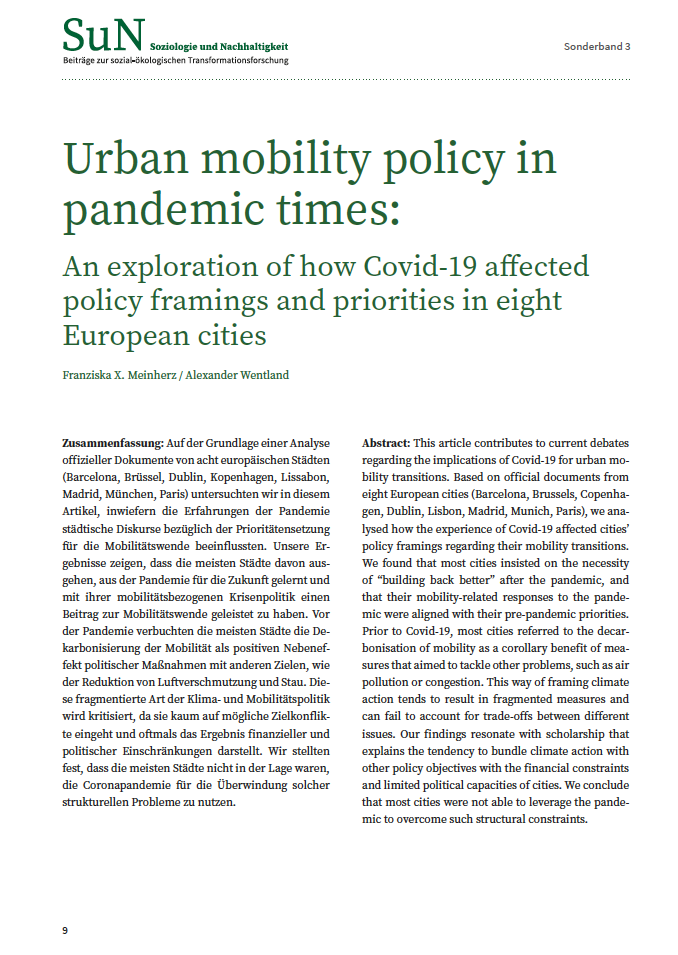Urban mobility policy in pandemic times
An exploration of how Covid-19 affected policy framings and priorities in eight European cities
DOI:
https://doi.org/10.17879/sun-2024-5270Schlagworte:
Urban mobility, Covid-19, Sustainability transitions, Crisis governance, CitiesAbstract
Auf der Grundlage einer Analyse offizieller Dokumente von acht europäischen Städten (Barcelona, Brüssel, Dublin, Kopenhagen, Lissabon, Madrid, München, Paris) untersuchten wir in diesem Artikel, inwiefern die Erfahrungen der Pandemie städtische Diskurse bezüglich der Prioritätensetzung für die Mobilitätswende beeinflussten. Unsere Ergebnisse zeigen, dass die meisten Städte davon ausgehen, aus der Pandemie für die Zukunft gelernt und mit ihrer mobilitätsbezogenen Krisenpolitik einen Beitrag zur Mobilitätswende geleistet zu haben. Vor der Pandemie verbuchten die meisten Städte die Dekarbonisierung der Mobilität als positiven Nebeneffekt politischer Maßnahmen mit anderen Zielen, wie der Reduktion von Luftverschmutzung und Stau. Diese fragmentierte Art der Klima- und Mobilitätspolitik wird kritisiert, da sie kaum auf mögliche Zielkonflikte eingeht und oftmals das Ergebnis finanzieller und politischer Einschränkungen darstellt. Wir stellten fest, dass die meisten Städte nicht in der Lage waren, die Coronapandemie für die Überwindung solcher strukturellen Probleme zu nutzen.
This article contributes to current debates regarding the implications of Covid-19 for urban mobility transitions. Based on official documents from eight European cities (Barcelona, Brussels, Copenhagen, Dublin, Lisbon, Madrid, Munich, Paris), we analysed how the experience of Covid-19 affected cities’ policy framings regarding their mobility transitions. We found that most cities insisted on the necessity of “building back better” after the pandemic, and that their mobility-related responses to the pandemic were aligned with their pre-pandemic priorities. Prior to Covid-19, most cities referred to the decarbonisation of mobility as a corollary benefit of measures that aimed to tackle other problems, such as air pollution or congestion. This way of framing climate action tends to result in fragmented measures and can fail to account for trade-offs between different issues. Our findings resonate with scholarship that explains the tendency to bundle climate action with other policy objectives with the financial constraints and limited political capacities of cities. We conclude that most cities were not able to leverage the pandemic to overcome such structural constraints.
(peer reviewed)

Downloads
Veröffentlicht
Zitationsvorschlag
Ausgabe
Rubrik
Lizenz
Copyright (c) 2024 Franziska X. Meinherz, Alexander Wentland

Dieses Werk steht unter der Lizenz Creative Commons Namensnennung 4.0 International.




